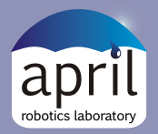
We present a method for learning efficient feature detectors based on in-situ evaluation as an alternative to hand-engineered feature detection methods. We demonstrate our in-situ learning approach by developing a feature detector optimized for stereo visual odometry.
Our feature detector parameterization is that of a convolutional filter. We show that feature detectors competitive with the best hand-designed alternatives can be learned by random sampling in the space of convolutional filters and we provide a way to bias the search toward regions of the search space that produce effective results. Further, we describe our approach for obtaining the ground-truth data needed by our learning system in real, everyday environments.
@inproceedings{richardson2013icra,
TITLE = {Learning Convolutional Filters for Interest Point Detection},
AUTHOR = {Andrew Richardson and Edwin Olson},
BOOKTITLE = {Proceedings of the {IEEE} International Conference on Robotics and
Automation ({ICRA})},
YEAR = {2013},
MONTH = {May},
KEYWORDS = {interest point detection, feature extraction, detector learning,
visual odometry, computer vision, ground truth},
}